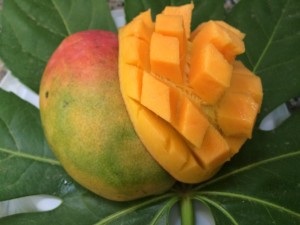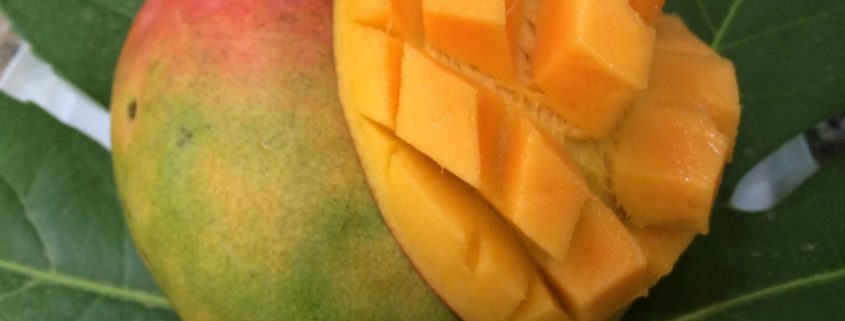August Monthly Morsels
 Mulling Over Mangoes
Mulling Over Mangoes
By Charna Sheinfeld, Nutrition Intern
With their succulent flavors, velvety textures, and floral aromas, it’s no wonder that mangoes are the most popular fruit worldwide. Yup! You read right. Even though for Americans apples and bananas are the most widely eaten fruit, mangoes rank higher on the international consumer market.
Most of the mangoes grown in the U.S. come from Mexico and the tropical countries in Central and South America such as Brazil, Guatemala, Haiti, and Ecuador, however they are grown in many countries in Asia, the Middle East and East Africa as well. Interestingly, a basket of mangoes is considered a gesture of friendship in India, and in many Latin American countries, a popular snack sold by street vendors is mango on a stick with its skin peeled back.
Mangoes deliver a multitude of nutrients that make eating them an even more enjoyable experience! One cup of mangoes, which is about half of a medium mango, is 100 calories, making it great as a filling snack. They serve an excellent source of vitamin C which is necessary for cognitive, neurologic, and immune functions as well as playing an important role in collagen formation and wound healing.
Mangoes also contain the antioxidant beta carotene, the nutrient well known for giving produce their orange and yellow color. Beta carotene is important for its antioxidant properties, protecting the body from free radicals which cause diseases. Beta Carotene has specifically found to be helpful in the prevention of certain cancers such as prostate, breast, and colon cancers. Beta Carotene is also important in its use for being converted into Vitamin A in the body. Vitamin A is critical for vision, immune function, healthy skin, hair, and bone growth.
Mangoes, like many other fruits, contain large amounts of fiber which is excellent for digestion, as well as its ability for slowing the absorption of sugar into the bloodstream, making them an excellent food for diabetics. Mangoes are also a good source of folic acid, vitamin B6 and copper.
Mangoes are excellent snacks on their own or can be used to make delicious salads, smoothies and salsas. Furthermore, mangoes have been found to have natural tenderizing properties, making them a perfect addition for marinades. Choose mangoes that are not too firm but not too soft, just those that have a slight “give”. Very firm mangoes need to be at room temperature in order to ripen.
Try these new mango recipes and let me know how you like them.
Grilled Mango and Peach Skewers
Mango Red Pepper Salad with Spice Crusted Tuna and Lime Dressing


Leave a Reply
Want to join the discussion?Feel free to contribute!